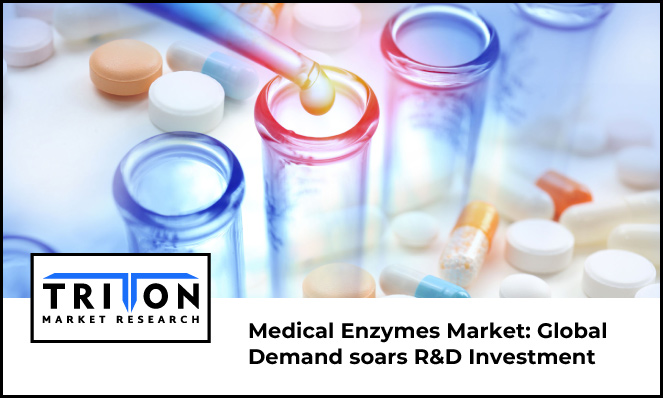



03, August 2022

In recent years, the prevalence of metabolism-related diseases and global health scenarios have compelled people to shift towards healthier lifestyles. Also, after COVID-19, consumers have become conscious about their health, leading to increased use of enzymes-based nutritional and immunity-boosting products.
Our studies indicate that the global medical enzymes market will advance at a CAGR of 6.78% during the forecast period 2022-2028. Factors accelerating this growth include advancement in enzyme engineering, increased demand in the pharmaceutical sector and the prevalence of gastrointestinal disorders, cancers and tumors.
As per the prediction of the American Cancer Society Journal, there will be approximately 1.9 million new cancer diagnoses and 6 lakh cancer-related deaths in the United States. To prevent the spread of cancer cells, enzymes are employed as therapeutic agents to strengthen the immune system and eliminate undesired cells. Cancers like leukemia have been treated with enzymes such as lkaline phosphatase, beta-glucosidases, etc., creating lucrative prospects for the global market.
On the other hand, strict regulatory processes and safety procedures while handling medical enzymes have challenged market players. Safety concerns for handling enzymes arise due to the toxic by-products emitted in the preparation process. To ensure that the products do not contain toxins, medicinal products are subject to regulations like Directive 65/65/EEC. Further, enzyme exposure is associated with risks like respiratory allergies and irritation in skin and eyes that must be controlled using proper mechanisms like isolation and contamination.
Properties of medical enzymes like breaking internal blood clots, dissolving wound swelling and promoting healing are expanding their application in treating various diseases such as gastrointestinal disorders, cardiovascular diseases and coagulation disorders, and cancer therapy. Enzyme biosensors like alkaline phosphatase, creatine kinase, aminotrans-ferases, dehydrogenases and others are used as analytical tools in diagnosing diseases.
Thrombolytic enzymes have great potential owing to their great affinity, specificity, catalytic activity, and stability. It is the leading segment in the type category. These enzymes find application in the treatment and diagnosis of blood clots at an early stage by activating plasminogen and developing a cleaved product called plasmin.
The components that frame the market and help in its growth are research & development, operations, and outbound logistics. To improve productivity and efficiency, operations analysis is crucial for confirming the quality and safety standards of the items delivered to the consumers.
With digitalization and advancement in engineering techniques, research is increasing to develop new products with quality standards. The advancement in research includes applied enzymology, enzyme therapy, novel application of enzymes, etc. The main aim of advanced techniques is the development of competitive and financially feasible products.
Outbound logistics includes optimization of product delivery costs and timely management with customer satisfaction to increase market growth opportunities.
Asia-Pacific will likely rise at a CAGR of 7.67% in the forecasting years. Rapid industrialization, rise in R&D expenditure, technological advancements and production techniques are the major factors driving the regional market.
For instance, immobilized enzyme technology enhances the properties of food enzymes and protein engineering. Additionally, it is anticipated that the growing attention of major pharmaceutical corporations to outsourcing drug discovery to all of Asia will help the market expand.
Furthermore, North America holds the leading position while rising at a CAGR of 6.57% and is expected to gain momentum over the forecasting years. The growth is due to the development of advanced products by the region’s companies. The mergers and acquisitions among the established players like Novus, DuPont and Thermo Fisher Scientific fuel the studied market.
For instance, the acquisition of Precision Biotics by Novozymes for $88.5 million gives latter a stronger entry point into the human probiotics supplement market.
The upsurge in the medical enzymes market is due to the rising health issues, growing customer awareness and utilization of healthcare specialty enzymes in several diagnostic and research activities. Drugs going off-patent will provide growth opportunities for the companies to develop new medical enzymes and focus on R&D.
The goal of advanced research in this field is to develop products that are not only competitive but economically viable. This has led to many mergers and acquisitions between dominant companies to upsurge enzymes' production, research and development. For instance, Sanofi shelled out $3.68 billion to buy Principia, which will advance the company’s R&D and accelerate the development of medicines.

Prevalent cases of terrorist attacks in today’s world is increasing the need for severe standards of security for public safety, and the global market for biometric technology scrupulously accommoda..
Prevalent cases of terrorist attacks in today’s world is increasing the need for..